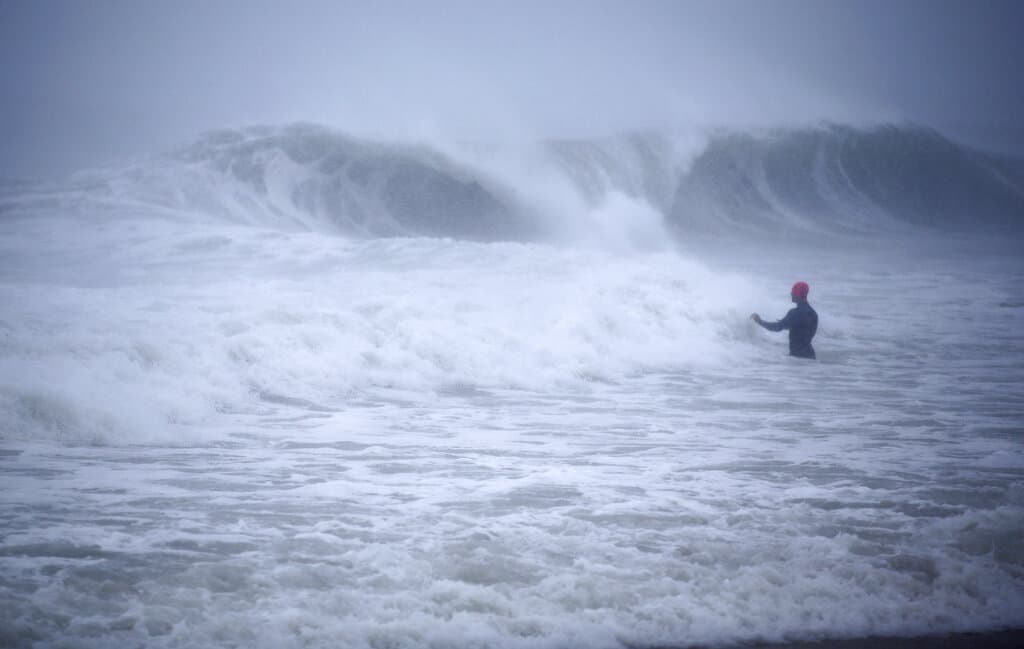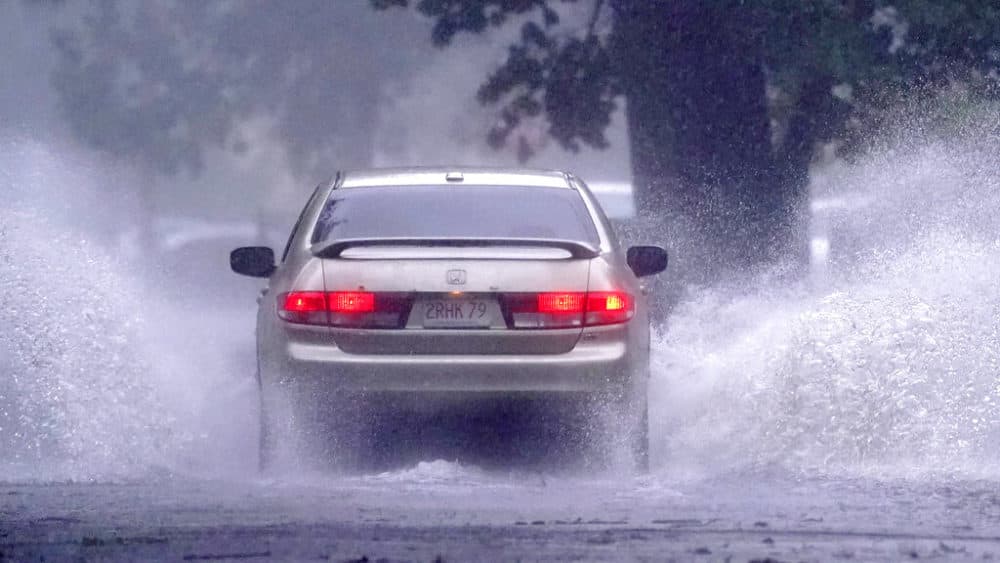Advertisement
Tropical Storm Henri Drenches Northeast As It Moves Inland

Tropical Storm Henri socked the Northeast with heavy wind and rain as it made landfall Sunday on the coast of Rhode Island, knocking out power to over 100,000 homes and causing deluges that closed bridges, swamped roads and left many people stranded in their vehicles.
The storm was downgraded from a hurricane before reaching New England, leaving many to breathe a sigh of relief in a region that has not taken a direct hit from a hurricane in decades. There were few early reports of major damage due to wind or surf.
But the storm’s heavy, sustained rains raised concerns about flooding from the storm that threatened to stall over the region before pivoting to the East and moving out to the Atlantic Ocean on Monday night. Some of the highest rain totals were expected inland.
By Sunday afternoon, Henri had sustained winds of about 50 mph as it moved inland across Connecticut, according to the National Hurricane Center. When it made landfall near Westerly, Rhode Island, it had sustained winds of about 60 mph and gusts of up to 70 mph.
Several major bridges in Rhode Island, which stitch together much of the state, were briefly shuttered Sunday, and some coastal roads were nearly impassable.
Rhode Island has been hit by hurricanes and tropical storms periodically — including Superstorm Sandy in 2012, Irene in 2011 and Hurricane Bob in 1991. The city of Providence sustained so much flooding damage from a hurricane in 1938 and Hurricane Carol in 1954 that it built a hurricane barrier in the 1960s to protect its downtown from a storm surge coming up Narragansett Bay. That barrier — and newer gates built nearby — were closed Sunday.
In Massachusetts, there is some concern about flooding overnight in parts of Worcester County and the Berkshires.
Massachusetts Emergency Management Agency director Samantha Phillips says there could be 8 to 10 inches of rain, and urges caution on the roads.
"We want to make sure that individuals aren't out and about and driving through flooded waters. It takes a very small amount of rain and floodwater to actually move a vehicle," she told WBUR. "It's incredibly dangerous. It is the way many individuals are harmed during storms."
Advertisement

Massachusetts State Police are enforcing a 40 mile per hour speed limit between mile marker 59 near Springfield, and the New York state line.
By Sunday afternoon, power outages affected over 78,000 customers in Rhode Island, 32,000 in Connecticut, 9,000 in Massachusetts and 4,000 in New York.
Some in New England cautioned against complacency, warning that Henri — if it does stall and dump multiple inches of rainfall — had the potential to inflict damage similar to Tropical Storm Irene in August 2011.
After Irene roared up the coast, many in the Northeast were relieved when the New York City area largely was spared. But then the storm settled over the Green Mountains, and Irene became the biggest natural disaster to hit Vermont since an epic 1927 flood. Parts of the state got 11 inches of rain in just 24 hours. Irene killed six in Vermont, left thousands homeless, and damaged or destroyed more than 200 bridges and 500 miles of highway.
“I remember Irene and media outlets outside Vermont brushing it aside as if no big deal while it hit Vermont,” Robert Welch, a podcaster, tweeted Sunday. “I’ll relax when I see it at sea on radar.”
In Connecticut, four nursing homes on the shoreline were evacuated, according to Paul Mounds, chief of staff for Connecticut’s governor. About 250 residents were relocated to other nursing homes, he said. Storm-related flooding was blamed for major delays along Interstate 91 near Hartford.
In one of his final appearances as governor before he is set to step down at the end of Monday over a sexual harassment scandal, New York Gov. Andrew Cuomo said that with the threat to Long Island diminishing, the state’s primary concern were inland areas like the Hudson River Valley, north of New York City, which was projected to get inches of rain over the next few days.
Rainfall in the Catskills “is a significant problem,” Cuomo said. “In the Hudson Valley you have hills, you have creeks, the water comes running down those hills and turns a creek into a ravaging river. I have seen small towns in these mountainous areas devastated by rain. That is still a very real possibility.”
President Joe Biden declared disasters in much of the region, opening the purse strings for federal recovery aid. The White House said Biden discussed preparations with northeastern governors and that New York Lt. Gov. Kathy Hochul, who succeeds Cuomo on Tuesday, also participated.
Major airports in the region remained open as the storm approached, though hundreds of Sunday’s flights were canceled. Service on some branches of New York City’s commuter rail system was suspended through Sunday, as was Amtrak service between New York and Boston.
The south coast of Massachusetts was largely spared from the worst of the storm. In New Bedford, the nation's top-grossing fishing port, boats were protected by the massive stone hurricane barrier — which the Army Corps of Engineers closed to control storm surges.
ML Baron, a volunteer spotter for the National Weather Service, says locals often get annoyed when hurricane warnings end up falling flat — but it's better to be prepared.
"We certainly dodged a bullet here," Baron said. "But if you want to live along the shore, consider yourself lucky this time. But there will be a next time."
With reporting by The Associated Press and WBUR's newsroom.